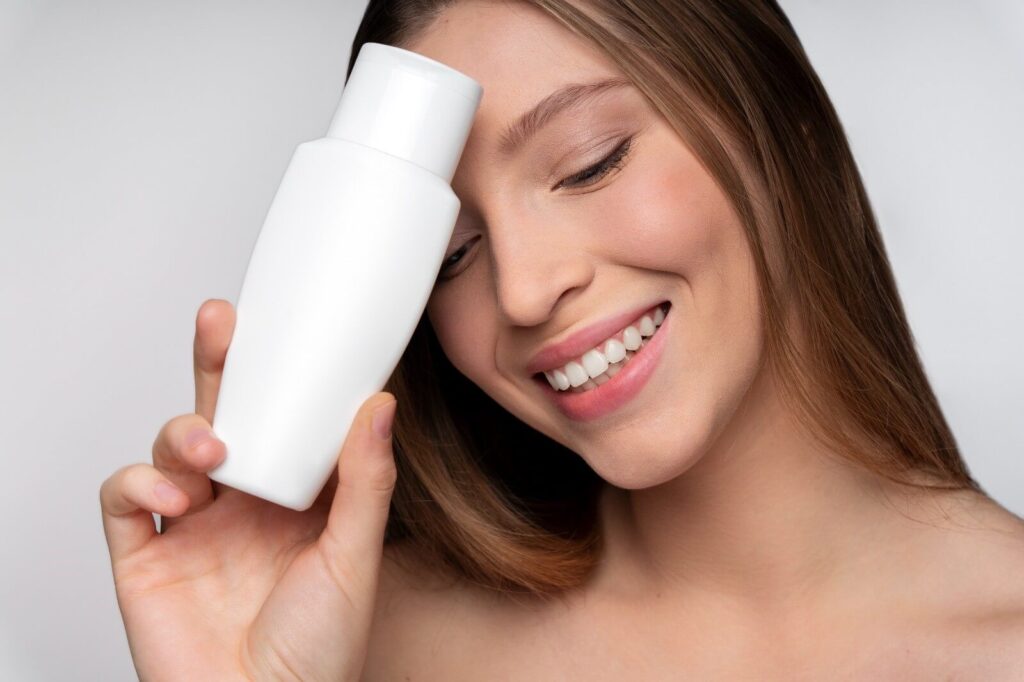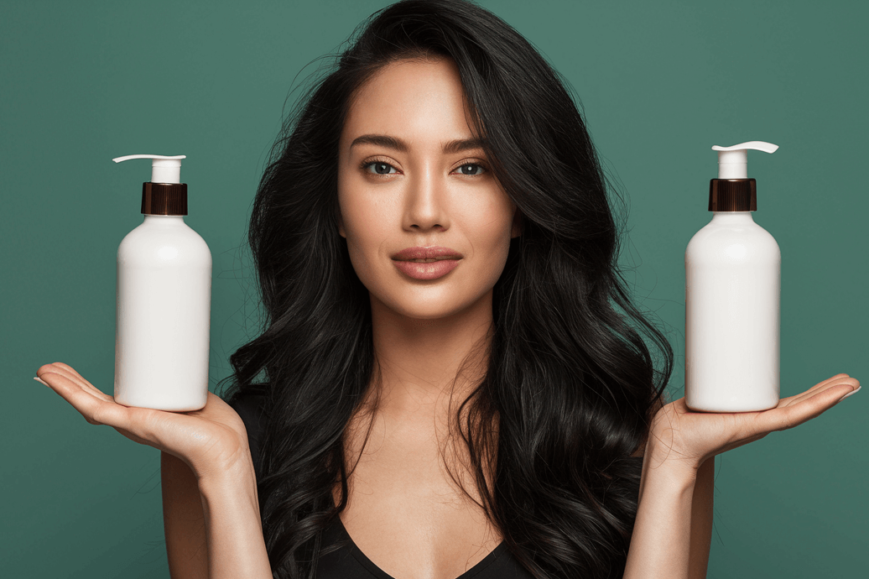It may have come as a surprise to you to hear that over 50% of people have hair issues due to improper hair care practices, including dryness, breakage, and dullness.
We’ll learn why routine shampoo and conditioner with hair washes are necessary for healthy, glossy hair.
A hair care regimen is the key to keeping your hair healthy and moist, thus avoiding damage and looking great daily. Now that you understand the rationale behind Routine shampoo and conditioner, it is time to know why they are essential and the benefits you will likely reap.
The Basics of Hair Care
Hair care is the process of washing, treating, perming, and conditioning hair to enhance its texture and appearance.
Regular hair-washing regimes entail washing hair frequently with a Natural shampoo and then conditioning it to help it maintain its natural state. This practice comprises washing the hair using a shampoo to cleanse the scalp and hair to eliminate dirt, oils, and product residues and rinsing it with a conditioner to soften the hair, give it a gloss, and close its cuticle.
Routine hair care involves washing and conditioning the hair at specific intervals, whether daily or weekly, depending on your hair type and requirements. This means washing hair with shampoo two to three times a week and washing with conditioner every time a person washes their hair. Frequency can be flexible depending on hair type, skin type, and overall living pattern.
Why Routine Shampoo and Conditioner Matter
Certainly! Let’s delve into the reasons why routine shampoo and conditioner are essential for maintaining healthy hair:
Cleansing:
- The shampoo helps wash the scalp and hair shaft and eliminates dirt, oils, and product residue.
- The hairs that grow from the roots need good air circulation for the best experience; a clean scalp provides just that.
Nourishment:
- Some of the necessary components imposed by the conditioner on the hair shaft include proteins and vitamins.
- These nutrients give the hair the required density, make it less prone to breakage and improve texture.
Moisture Balance:
- Shampoo, to a certain degree, helps to clean hair, but it can also remove sebum. Conditioner brings back the lustre of the hair by preventing it from drying.
- It’s crucial to remember that you play a significant role in your hair’s health and appearance. By maintaining the right moisture balance, you can achieve a softer, more manageable, and less frizzy look. This knowledge empowers you to take control of your hair’s health and appearance.
Choosing the Right Products
Selecting the Right Shampoo

Selecting the correct product to use when washing your hair is crucial for healthy hair. Here are some tips:
- Identify Your Hair Type: Understanding your hair type can help determine whether you have normal, oily, dry, or combination hair. It will also help you select the appropriate products.
- Consider Scalp Condition: If your scalp is sensitive, go for products containing anti-inflammatory agents such as tea tree oil or aloe vera.
- Target Specific Concerns: Regarding your hair, one size does not fit all. Choose a shampoo and conditioner that caters to your specific needs: for frizzy hair, opt for a product that offers hair colour protection, and for thin hair, choose a formula that adds volume.
- Check Ingredients: Select products containing favourable components such as vitamins, proteins, and natural oils. Do not use chemicals like sulfates and parabens, which dry hair and lead to breakage.
- Read Reviews: Learn from other individuals with similar hair types and know the impact of various products. This can help determine what might be suitable for your hair.
Selecting the Right Conditioner

Selecting the right conditioner is just as important:
Product Selection
| Hair Type | Recommended Shampoo | Recommended Conditioner |
|---|---|---|
| Oily | Clarifying Shampoo | Lightweight Conditioner |
| Dry | Hydrating Shampoo | Deep Moisturizing Conditioner |
| Normal | Gentle Daily Shampoo | Nourishing Conditioner |
| Combination | Balancing Shampoo | Light to Medium Conditioner |
| Sensitive | Soothing Shampoo | Gentle Conditioner |
Choosing the right Routine shampoo and conditioner can address your specific needs and achieve healthier, more beautiful hair.
How to Make a Hair Care Schedule
Establishing a routine when taking a Routine Shampoo and Conditioner is easy because you must repeat the process.
- Assess Your Hair Type: If your hair is always greasy, you may classify it as oily; if it is always dry, you can classify it as dry. If it is greasy and dry at some point, you may classify it as usual or combination hair.
- Choose the Right Products: Choose shampoos and conditioners based on your hair needs and type.
- Set a Schedule: Determine the Frequency of hair washing and deep conditioning based on an individual’s hair type.
- Please stick to the Routine: In a nutshell, it will be essential to maintain consistency.
- Adjust as Needed: Pay attention to how often your hair becomes tangled or feels dry and damaged and change its treatment regime or product selection accordingly.
Recommendations on How often to wash and condition based on different hair types
- Oily Hair: Wash in a way you do in the middle of the week or mid-week wash. Treat them gently whenever you wash your hair or put shampoo on it.
- Dry Hair: Wash 1-2 times a week to prevent the skin on the face from becoming dry and dull. Each time, use an intense conditioning treatment.
- Normal Hair: It is advisable to wash it twice to three times a week.
- Combination Hair: It is recommended to wash your hair at least twice or twice a week.
- Sensitive Scalp: If worn regularly, wash it with a mild shampoo when needed.
Common Mistakes to Avoid
- Over-washing
Over-washing your hair can lead to several issues:
- Using Incorrect Products
Using products not fitted to your hair type or needs can have adverse effects:
- Neglecting Conditioner
Conditioner plays a vital role in keeping hair healthy:
If you use these products correctly or make mistakes during hair care, your hair and scalp will look better.
Advantages of Routine Shampoo and Conditioner

Certainly! Let’s explore the benefits of routine shampoo and conditioner in more detail:
- Prevents Hair Damage and Breakage:
- Optimal Environment for Hair Follicles:
- Promotes Healthy Hair Growth:
Remember to incorporate these points into your article, emphasizing the importance of maintaining a regular shampoo and conditioner routine.
Side Effects and Contraindications
Routine shampoo and conditioner can have significant benefits, but there are considerations to keep in mind:
- Product Sensitivity: While using shampoos or conditioners, some individuals may develop skin reactions on the scalp or allergies to the products.
- Moderation is Key: Overusing shampoo can strip the scalp of its natural oils, leading to dryness and inflammation. It’s important to use shampoo in moderation to maintain a healthy scalp.
- Heavy Formulas: The heavy conditioners may make fine hair look lifeless or build up on the scalp.
- Contradictions: It is essential to understand that not all hair types require washing and conditioning every other day.
Conclusion
According to hair loss treatment, Routine Shampoo and Conditioner are essential for healthy, beautiful hair. Washing with a shampoo removes grease, while conditioning restores lost natural oils necessary for healthy hair growth. Besides improving the appearance of hair by making it smoother and shinier, this routine is also beneficial for the scalp, as it has to be cleaned for this purpose. You can avoid damage by looking at the right products and observing consistency, promoting easy-to-manage and healthy hair.
Thus, paying attention to your hair is highly recommended to make it as healthy and beautiful as possible. To choose the right products, you must determine your hair type and the particular issues it faces. Wash and condition according to the recommended Frequency to meet your specific requirements. Patience is required—develop good habits to sustain them over the long haul. However, the best approach to healthy hair starts with using the correct Routine Shampoo and Conditioner and putting effort into maintaining your hair daily. This will enhance the look of your hair and its health and well-being and, in turn, improve your confidence.
FAQs for Routine Shampoo and Conditioner
What are the advantages of using routine shampoo and conditioner to wash your hair?
Shampoo removes dirt, oil, and other products from the scalp and hair, while conditioner moisturizes, nourishes, and detangles hair to prevent brittleness and out-of-control.
Is it necessary to apply a deep conditioner or a hair mask?
Intensive treatments or hair masks must be applied to moisturise and restore hair strands further. They are ideal for all hair types and are especially effective for dry, damaged, or heat-styled hair. Please be sure to use it either once a week or whenever the need arises.
Is washing hair regularly with routine shampoo and conditioner beneficial for hair growth?
However, routine shampoo and conditioner mostly clean and treat hair and enhance its condition. Although this may affect the scalp, it can help hair grow if it provides a healthy environment. Search for hair products that are soothing to the scalp and do not harm the skin or cause dryness.
Does routine shampoo and conditioner alone address specific hair problems like frizz or dryness?
Indeed, most hair problems can be overcome by carefully using the right products. If you want your hair to be moisturised, try to find moisturising hair products and choose shampoos and conditioners with natural oils (for instance, argan or coconut oil).
Is it possible to solve scalp problems such as dandruff through ordinary washing, Routine Shampoo and Conditioner?
In fact, selecting a specially formulated shampoo containing active elements such as tea tree oil or salicylic acid can reduce dandruff and provide the necessary relief to the scalp. Another way to avoid a dry scalp is to constantly wash and condition the head using conditioner.
Does thin or fine hair not benefit from routine shampooing and conditioning?
Indeed, various volumising or thickening Routine Shampoo and Conditioner can help make hair look fuller. Avoid using rich products that might make fine hair look even more flat; opt for products that provide volume but do not make hair oily.

